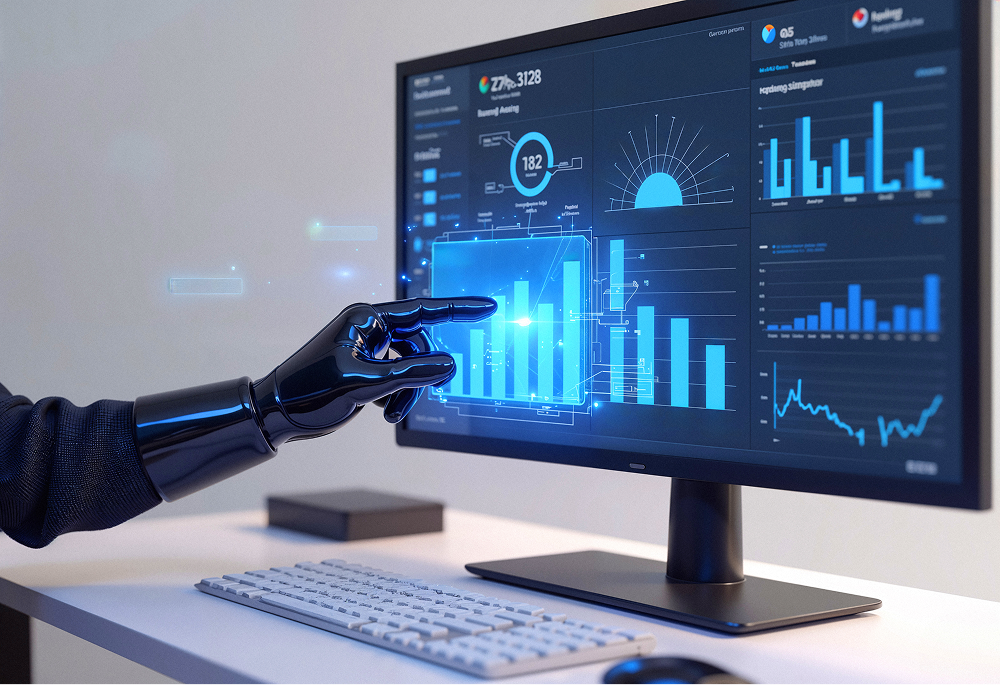Accounting firms started testing AI tools about five years ago. Some experiments failed. Others changed how people work. The technology handles invoice processing and expense categorization faster than any human team, but it still struggles with judgment calls and client conversations.
The “will AI replace accountants” debate misses the point. Banks and large firms now use AI to flag unusual transactions and automate reconciliations. Their accountants didn’t lose jobs—they stopped doing repetitive work. They focus on investigating flagged items, explaining reports to clients, and planning tax strategies. AI finds patterns in thousands of transactions. Accountants decide what those patterns mean.
This article covers real examples from firms using AI accounting software, breaks down which technologies deliver results, and explains implementation without the usual vendor hype.
The Current State of AI in Accounting
Accounting software already uses AI, though many users don’t realize it. QuickBooks and Xero automatically categorize transactions based on past patterns. They’re not perfect but they learn from corrections.
Larger firms adopted AI for audits first. The software scans thousands of invoices and flags duplicates or unusual amounts. One mid-sized firm cut invoice review time from three days to six hours. The accountants still check everything, but they’re not reading every line anymore.
Bookkeepers report mixed results. AI handles bank reconciliations and expense tracking well. It struggles with nuanced decisions—whether a purchase counts as a business expense or how to classify a one-time transaction. Client communication remains entirely human. Nobody wants a chatbot explaining why their tax bill increased.
A Remarkably Brief History of AI in Accounting
Accounting automation started with spreadsheets in the 1980s. Excel replaced ledger books and calculators. Nothing fancy, just fewer math errors.
Cloud software came next. QuickBooks and Xero connected to bank accounts and pulled transactions automatically. Accountants stopped typing numbers from statements.
AI showed up around 2015, mostly scanning receipts. The technology read blurry photos and extracted amounts—useful but unreliable. You still had to check everything.
Things changed after 2018. Software started guessing transaction categories correctly most of the time. It learned from corrections. Accountants spent less time on data entry, more on actual accounting.
COVID accelerated everything. Firms went remote overnight and needed tools that worked without supervision. AI that could process invoices and flag problems became essential, not experimental.
Now it’s normal. Most firms use some form of AI daily.

Is AI Good Enough to Replace Accountants Now?
Not even close. AI does certain tasks really well and completely fumbles others.
It processes invoices fast. Reconciles bank accounts without complaining. Catches duplicate payments that slip past tired humans. For a business that runs the same transactions month after month, AI handles maybe 70% of basic bookkeeping.
Then reality hits. A client starts a side project. AI keeps categorizing everything under the old business. Someone buys equipment—software tags it as office supplies. New tax rules come out in March—AI has no idea until someone teaches it.
One accountant put it simply: “Software does boring stuff. I do anything that needs a brain.”
Client calls are still human. Nobody wants to hear a robot explain their tax bill. Strategic planning requires judgment. Fixing payroll errors needs context the software doesn’t have.
Bookkeepers who just enter data are struggling. Those who spot problems, interpret trends, and actually talk to clients? They’re busy as ever. The work shifted but the need didn’t go away.
AI Technologies in Modern Accounting
Several AI technologies changed how accounting firms operate. They’re not futuristic concepts—firms use them daily.
Machine learning powers transaction categorization. The software watches how accountants classify expenses, then mimics those decisions. It gets smarter over time but needs corrections when business patterns change. QuickBooks and Xero both use this approach.
Optical character recognition (OCR) reads receipts and invoices. Point your phone at a crumpled receipt, and the software extracts the date, amount, and vendor. Accuracy improved dramatically in recent years. It still struggles with handwritten notes or faded ink.
Natural language processing lets accountants ask questions in plain English. “Show me all consulting expenses over $5,000 last quarter” works without building complex reports. The technology understands context better than early versions, though it sometimes misinterprets vague requests.
Robotic process automation handles repetitive workflows. It logs into systems, downloads reports, matches data across platforms, and flags discrepancies. One firm automated their month-end close process—what took three days now takes six hours of review time.
Predictive analytics forecast cash flow and identify financial risks. The software analyzes historical patterns and warns when numbers deviate. Useful for planning, less reliable during unusual periods.
Anomaly detection scans thousands of transactions for outliers. It catches potential fraud, duplicate invoices, and data entry errors humans miss during manual review.
Most firms mix several technologies. They don’t replace accountants—they handle the tedious parts so accountants can focus on interpretation and advice.
How is AI Affecting Accounting?
AI changed what accountants do all day, not whether they have jobs.
The work shifted dramatically. Junior accountants used to spend weeks on data entry and reconciliation. Now software handles that in hours. Firms hire fewer entry-level positions but need more people who can analyze results and advise clients. The career ladder changed—new accountants start with more complex work sooner.
Speed increased across everything. The month-end close that took a week now takes two days. Audit preparations that require three people for a month need one person for two weeks. The time savings are real, but clients expect faster turnarounds, so the pressure just shifted.
Accuracy improved for routine tasks. AI catches duplicate invoices, math errors, and mismatched transactions better than humans. It never gets tired or distracted. But it also flags false positives that waste time investigating non-issues.
Advisory work expanded. Accountants spend more time interpreting data, explaining trends, and planning strategy. Clients don’t just want tax returns—they want insights. AI provides the data; accountants provide the context and recommendations.
Smaller firms feel the pressure. Solo practitioners who built their business on basic bookkeeping struggle to compete with automated solutions. Those who offer strategic advice and personalized service remain busy. The middle ground—routine bookkeeping without added value—became harder to sustain.
Compliance got more complex. AI tools need oversight. Someone has to verify the software classified transactions correctly and follows current regulations. New problems replaced old ones.
Benefits of AI Integration
AI delivers tangible improvements in accounting operations, though the benefits vary by firm size and client type.
Time savings are substantial
Firms report 40-60% reductions in data entry and reconciliation time. One mid-sized practice cut their monthly close from five days to two. That freed up staff for tax planning and client consultations—higher-value work that clients actually pay premium rates for.
Error rates dropped significantly
AI catches transposition errors, duplicate entries, and mismatched transactions that humans miss during manual review. It doesn’t get tired at 4pm or distracted during the busy season. One audit team found AI flagged 30% more discrepancies than their previous manual process.
Scalability improved without proportional hiring
Firms handle more clients with the same staff size. AI processes 1,000 transactions as easily as 100. This matters during tax season when everyone needs work done simultaneously.
Real-time reporting became standard
Clients access current financial data instead of waiting weeks for monthly reports. Business owners make faster decisions with up-to-date information. Accountants spend less time preparing reports and more time discussing what the numbers mean.
Fraud detection got better
AI spots unusual patterns across thousands of transactions—sudden vendor changes, round-number invoices, payments to new accounts. It flags potential issues accountants can investigate before they become serious problems.
Junior staff develop faster
New accountants skip months of data entry and start analyzing financials sooner. They learn interpretation and client communication earlier in their careers.
Cost efficiency varies
Large firms see clear ROI within months. Smaller practices need 1-2 years to recoup software costs. The savings come from doing more work with existing staff, not from layoffs.
The catch? Implementation takes effort. Someone needs to train the AI, monitor its accuracy, and handle exceptions it can’t resolve.

What Tasks Will Remain Human-Centered
Certain accounting functions resist automation because they require judgment, relationships, or contextual understanding AI doesn’t possess.
Client communication stays entirely human
Nobody wants software explaining why their taxes increased or their margins dropped. Clients call when they’re confused, anxious, or facing decisions. They need reassurance and plain-English explanations, not algorithmic responses. One accountant mentioned clients specifically request her, not her firm’s chatbot, even for simple questions.
Strategic tax planning requires human insight
AI suggests deductions based on rules, but optimal tax strategy considers personal circumstances, risk tolerance, and long-term goals. Should a business owner take distributions or reinvest? That depends on factors no algorithm captures—retirement plans, family situations, growth ambitions.
Complex problem-solving needs context
A restaurant suddenly shows huge food costs. AI flags the anomaly. An accountant investigates and discovers the owner started catering. The software sees a problem; the human understands the business context.
Ethical judgment can’t be automated
Aggressive tax positions, questionable deductions, and gray-area classifications require professional judgment. Accountants weigh risks, interpret regulations, and sometimes tell clients “no, that won’t fly with the IRS.” Software follows rules; humans understand consequences.
Relationship management drives business
Clients hire accountants they trust, often through referrals and personal connections. Annual planning meetings, check-in calls, and business advice build those relationships. AI handles transactions; humans build trust.
Audit negotiations remain personal
When the IRS questions a return, someone needs to explain, negotiate, and advocate. Software can’t argue context or extenuating circumstances with a tax examiner.
Adapting to change requires flexibility
New regulations, unique client situations, and industry-specific issues need creative solutions. AI works within programmed parameters. Accountants figure out novel approaches.
The pattern is clear: routine and rules-based work moves to AI. Anything requiring judgment, empathy, or creativity stays human.
Specialized Accounting Roles and AI Impact
AI affects different accounting specializations unevenly. Some roles changed dramatically while others barely noticed.
Bookkeepers face the most disruption
Basic transaction recording and bank reconciliation—the core of traditional bookkeeping—is exactly what AI does best. Bookkeepers who only enter data struggle to justify their fees. Those who evolved into financial coaches, helping small business owners understand their numbers and make better decisions, remain busy. The title stayed the same but the job became advisory.
Tax accountants see mixed impacts
Software handles standard returns efficiently. TurboTax already automated simple individual taxes years ago. But complex tax situations—multi-state businesses, international transactions, estate planning—still need human expertise. Tax law changes constantly, and interpreting new regulations requires judgment AI doesn’t have. Strategic tax planning grew as a specialty because clients want optimization, not just compliance.
Auditors adopted AI fastest
Large firms use algorithms to scan entire datasets instead of sampling. The technology finds anomalies, duplicate payments, and unusual patterns across millions of transactions. Audit teams spend less time reviewing routine items and more time investigating flagged issues. The work became more investigative and less procedural. Junior auditors still exist but they analyze exceptions rather than checking boxes.
Management accountants expanded their role
AI handles budget tracking and variance reports automatically. Management accountants focus on interpreting trends, forecasting scenarios, and advising executives. They became strategic partners rather than report generators. One CFO mentioned his management accountant now attends board meetings—something that never happened when she spent her time consolidating spreadsheets.
Forensic accountants gained tools
AI excels at pattern recognition, making fraud detection more sophisticated. Forensic specialists use these tools but still need deep investigative skills and courtroom testimony abilities. The technology finds suspicious activity; humans build the case and explain it to juries.
CFOs and controllers shifted focus
They spend less time on financial close processes and more time on strategic planning, risk management, and board communication. AI handles routine reporting; senior finance leaders interpret what it means for business strategy.
Payroll specialists face automation pressure
Payroll processing became highly automated, but complex situations—multi-state employees, contractor classifications, benefits administration—still need human oversight. The role moved toward HR integration and compliance rather than pure processing.
The common thread: roles focused on execution got automated. Roles requiring interpretation, strategy, and human interaction became more valuable.
The Limitations of AI in Accounting
AI breaks down faster than vendors admit. Accountants deal with these failures constantly.
Unusual situations confuse it completely
A bakery starts offering cooking classes. AI keeps tagging instructor payments as “supplies” because it only knows bakery expenses. You have to manually fix the same mistake repeatedly until the software finally learns—which takes months.
It has zero context
Software flags a $50,000 equipment purchase as suspicious. You know the client mentioned buying that machine three months ago. AI just sees a big number and panics. It processes transactions without understanding the business behind them.
Judgment calls go wrong
Is this dinner meeting deductible? Should we capitalize this repair or expense it? AI guesses based on history and gets it wrong half the time. These aren’t small mistakes—they affect tax liability and audit risk. No accountant trusts software to make these calls alone.
New tax laws create chaos
Rules change every year. AI needs updates and retraining each time. When PPP loans rolled out, accountants spent weeks teaching software how to handle forgiveness applications. The technology can’t read IRS notices or interpret vague guidance.
False alarms waste tremendous time
AI flags suspicious activity constantly. Most turn out fine after investigation. One accountant said she spends two hours daily checking alerts that lead nowhere—time she used to spend on actual accounting.
Client conversations can’t be automated
Nobody wants a chatbot explaining their audit or tax strategy. Clients need reassurance and clear explanations from someone who understands their situation.
AI helps with routine work but needs constant babysitting for everything else.

Ethical Considerations for AI in Accounting
AI creates messy ethical problems the profession hasn’t figured out yet. Who takes the blame? Software miscategorizes a major expense. The IRS audits your client and assesses penalties. You signed the return, so you’re liable—but the AI made the mistake. Try explaining “my software did it” to a malpractice insurer. They don’t care.
Bias sneaks in quietly. AI learns from old data. If you’ve historically been lenient with certain deductions or stricter with specific industries, the software copies those patterns. You don’t even notice it’s happening. One accountant discovered her AI flagged new clients way more aggressively than longtime ones—learned behavior she hadn’t intended to teach it.
Client data sits somewhere else. Cloud AI means your client’s financial records live on servers you don’t control. You promised confidentiality. The software company promises security. Neither guarantee means much after a breach.
You can’t just trust the output. Your CPA license requires professional judgment. Rubber-stamping AI recommendations violates that. But if you check everything manually, what’s the point of using AI? Nobody’s quite sure where professional responsibility ends and software limitations begin. The rules haven’t caught up to the technology.
The Future of the Accounting Profession
The profession is split into two paths, and accountants need to pick one soon.
Commodity services are dying. Basic bookkeeping and simple tax returns face brutal pricing pressure. AI does this work cheaper and faster. Accountants competing on price for routine services will struggle within five years.
Advisory work is exploding. Business owners drowning in AI-generated reports need someone to explain what matters. Strategic tax planning, financial forecasting, and CFO services command premium fees. Clients pay for insight, not data processing.
The skills gap is widening. New accountants need less technical processing ability and more communication skills, business acumen, and strategic thinking. Universities still teach debits and credits while firms need people who can interpret trends and advise executives.
Firm structures are changing. The traditional pyramid—partners at top, armies of junior staff doing grunt work—doesn’t work when AI handles entry-level tasks. Firms are flatter, smaller, and more specialized.
Accounting isn’t disappearing. It’s becoming an advice profession instead of a processing one. Accountants who adapt will thrive. Those who don’t will compete with software that costs $50 monthly.
Frequently Asked Questions
No. AI handles data processing and routine tasks, but can’t provide strategic advice, interpret complex regulations, or manage client relationships. The job is changing, not disappearing. Accountants who only do data entry face pressure. Those who advise clients remain in high demand.
Yes, but understand what you’re signing up for. Entry-level work looks different now—less data entry, more analysis. Focus on developing advisory skills, business understanding, and client communication. Technical accounting knowledge still matters, but it’s not enough by itself anymore.
Professional judgment, client communication, strategic planning, ethical decision-making, and contextual problem-solving. AI can’t negotiate with the IRS, calm anxious clients, or determine the best tax strategy based on personal circumstances and risk tolerance.
Learn to use AI tools effectively rather than resist them. Develop advisory and consulting skills. Specialize in complex areas like forensic accounting, international tax, or CFO services. Build strong client relationships. Focus on high-value work that requires human judgment.
Certain tasks became obsolete—manual data entry, basic reconciliations, simple transaction categorization. But new responsibilities emerged: interpreting AI outputs, handling exceptions software can’t resolve, providing strategic guidance. Total accounting jobs may decrease slightly, but demand for skilled accountants remains strong.
Complacency. Accountants who refuse to adapt and keep doing things the old way will struggle. The technology itself isn’t the threat—it’s a tool. The real risk is becoming irrelevant by not evolving with the profession.
Conclusion
Accounting changed. AI handles the boring stuff now—data entry, reconciliations, basic categorization. It’s fast and accurate for routine work. But it can’t think, can’t advise clients, and breaks down constantly on anything unusual.
Accountants aren’t going anywhere. The job just shifted from processing transactions to interpreting them. Clients don’t need someone to enter numbers anymore. They need someone to explain what those numbers mean and what to do about them.
If you’re still doing accounting the old way, you’ll struggle. If you’re using AI as a tool while focusing on advisory work, you’re fine.
Want help figuring out which AI tools actually work for your practice? Or need a strategy for automating the grunt work without losing control? We help accounting firms implement practical AI solutions that save time without creating new headaches. Get in touch—we’ll skip the sales pitch and talk about what actually works.




